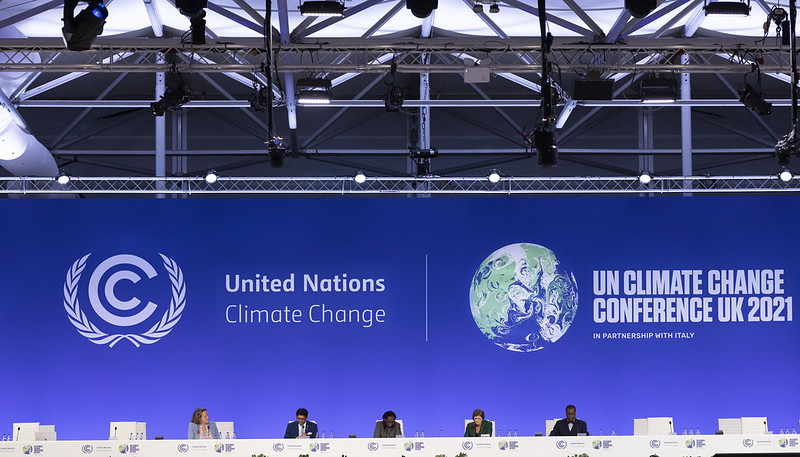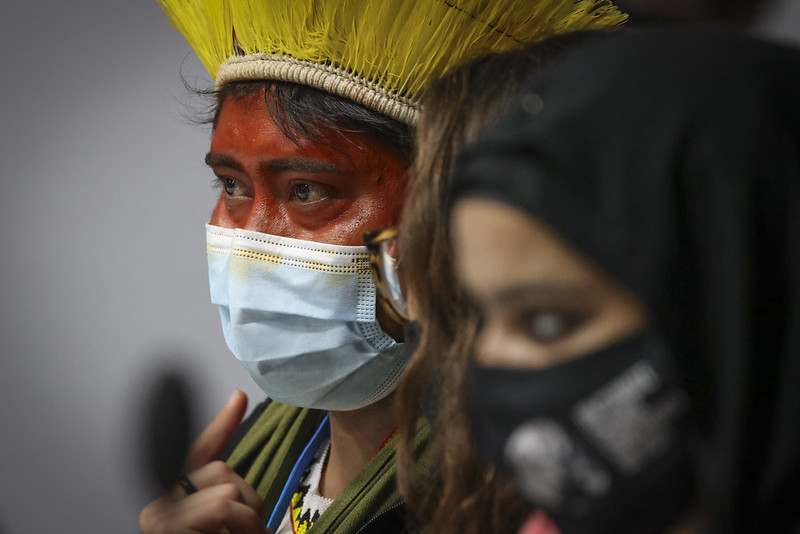Professor Lena Dominelli, Professor of Social Work, Faculty of Social Sciences, University of Stirling

Long-standing COP attendee Lena Dominelli reflects on her time at COP26 so far and the twists and turns, promises and anticipation of what the conference will – or will not – deliver.
What a hectic week it has been at COP26, especially juggling it round teaching commitments. Nonetheless, there is a buzz of hope about the place. Many promises made were ones that had emanated from previous COPs, e.g., the £100 billion for industrialising countries. But there is a completely new one – reducing methane gas emissions. It heats up the earth 25 times more than carbon dioxide, but decomposes in the atmosphere fairly quickly. Thus, politicians at COP26 are calling it a ‘quick win’. I hope they are right because it would lead to a significant reduction, but we need some of the biggest polluters like China on board. It was a shame that President Xi Jinping’s request to join by video link was turned down, because had he attended virtually (I understand he hasn’t even travelled in China due to Covid-19), he may have felt enough pressure on him to agree to this new measure.
Scotland can certainly reduce methane emissions. It could start with places like Grangemouth and begin to capture this substance and make use of its by-products instead of releasing them into the atmosphere.
Some of the conference rooms still continue to be a challenge to find, although the location is not that extensive, unless you are walking from the Blue Zone to the Green Zone, like I do (takes me 30 mins, but there is a bus if the timing is right). However, the security people and the police are very friendly, as I check every twist and turn to make sure I am heading in the right direction. And I am pleased that our police are not armed as they have been in some places I have attended. Most participants are well-behaved and wear their masks (though many on the trains to the venue do not).

I have met many amazing people from areas all over the world, and have been moved to listen to the tales of hardship that many from the SIDS (small island developing nations) and others from Africa have described. When I have some time, I will go into their stories of hardship, survival, courage and resilience show the amazing will to survive and flourish among our fellow inhabitants of our precious planet. Others are using research to show people alternative ways of doing business. For example, I listened to a professor and his PhD student from Turkey recount their careful measurements of greenhouse gases being produced by some of their big cities, and how they suggested alternatives that could reduce their reliance on fossil fuels. This was a great example of universities engaging with local communities to get change accomplished.
An international and intergenerational conversation
This week was also the period that I hope some of you were able to see the Exhibition on Making Visible Social Work’s Contributions to Climate Actions. If you haven’t, you can follow it on the University of Stirling’s website.
Also profiled here is reflection on a wonderful side-event that was run jointly by the International Association of Schools of Social Work and the University of Stirling in the Iris Murdoch Conference Centre on Thursday, 4th November. The event took the form of a seminar entitled, Living on the Edge: Young People Talk About Climate Action. It began with a video created by undergraduate students at Zayed University in Dubai, which can be viewed below.
The video was followed by a stimulating lecture by Professor Vishanthie Sewpaul of Durban, South Africa which included Hilda’s story, one of the most moving experiences of the calamities climate change wreaks on the world’s poorest countries because rich countries and large emerging countries like superpower China, and soon-to-be superpowers like India and Russia (3rd and 4th largest emitters – China and the USA are first and second respectively) will not reduce their emissions to net zero for decades yet – 2060 in the case of China and Russia, and 2070 in the case of India. This is unacceptable. It is quite wrong to say we have to industrialise and lift our people out of poverty using coal and other fossil fuels. That was the case when the West industrialised, but it is no longer the only option now. The renewable energies and more investments in these are much better for producing clean, green paths to development and taking people out of poverty including with the development of highly paid green jobs, than going down the dirty, polluting, low paid path of yesteryear. Politicians of these great, huge countries, please listen to the voices of young people. The earth cares not a jot whether it is the UK, the USA, China or India or Russia that emit carbon by-products into the atmosphere, waters or soils. They will find their way across borders, causing climate havoc and ill health among people going about their daily lives. Living decent lives should not have to cost the earth if all nations of the world worked together to eliminate such harmful emissions now – North, South, East, and West, and if all nations showed global solidarity and helped each other by sharing these technologies, ignoring their patents (or abolishing them for the common good). Let’s rise to the challenge. Our futures, all of our futures, depend on all of us taking action now!
After a short break, the seminar continued with five young people (Astrid, Ellie, Archie, Holly, and Eva) along with their Headteacher, Ms Gillian Freeland, telling their amazing stories of their actions on climate change and their aspirations for a more egalitarian, green future in which the world shared resources and helped each other. They have been pivotal in leading their school, Alva Academy in Clackmannanshire, into taking climate change seriously and promoting engagement through a range of activities including ‘Meat-free Mondays’ to recycling materials and reducing their demands on fossil fuels by cycling and walking to school. These inspirational young people are a positive sign of the future if older people can desist telling them what to do, and listen to them instead. These young people have expressed their stance in climate matters eloquently in this video, Youth Voices of Climate Change, produced as part of their campaign.
This message was made loud and clear on Friday – Youth Day, when young people from all over the world went on strike to get adults to listen to them. And on Saturday, the March included young and old – thousands of us, marching together for a cleaner, greener world. Let’s hope politicians heard and will implement the many messages of hope and actions and will move to implement these the day after COP ends. I met a fascinating, bright, talkative five year old on the train to COP going to the March! His commitment bolstered me for the day. He had made his own sign which asked us to take action now, and featured a bright green globe that he drew. Well done Jackson! The message is getting through to youngsters. What about our elder politicians, especially the men who dominate COP26 proceedings? Let’s get them to act now, by holding them accountable for their promises.
The reality is that action to get to net-zero by 2030 is needed now, not by 2050 as the UK Government proposes. Not 2060, or 2070, but within the next decade. Then we will be able to say COP26, by bringing the world to act speedily and promptly helped avert a global climate disaster. May our politicians show the wisdom to do this.
